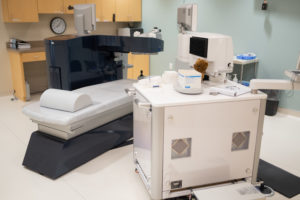
When it comes to vision correction procedures, it’s normal to have questions, and we’re here to make sure you have the answers you need. Check out these LASIK FAQs to get answers before you schedule your Houston LASIK consultation at Whitsett Vision Group!
Of all of the LASIK FAQs, this is our most frequently asked LASIK question. To determine if you are a good candidate, we recommend you come in to one of our offices for a free LASIK consultation with our counselors. During your free consultation, our refractive counselor and staff will perform diagnostic testing, and discuss your particular situation to determine if you are a good candidate for LASIK. If you are not a LASIK candidate, you may still be a candidate for another refractive procedure, such as ASA, PTK, ICL, or Refractive Lens Exchange. Our counselors will discuss your options with you at your consultation.
Most patients wearing glasses and soft contact lenses are good candidates for LASIK. We are able to treat a large range of prescriptions in patients who are myopic (nearsighted), hyperopic (farsighted), and patients with astigmatism.
The best way to determine if you are a LASIK candidate is to have a free consultation, so our counselors and staff can assess your specific situation. In general, the following things might cause you not to be a good LASIK candidate:
- Autoimmune Conditions
- Eye Injuries, or certain medical eye diseases
- Fluctuating Prescription
- Pregnancy and nursing
- Thin corneas
If you experience one of these conditions, we still recommend you reach out to one of our LASIK counselors, as there may be another option for you.
At Whitsett Vision Group, our commitment to investing in the best, safest technology is one of the greatest benefits we can offer our patients. Our surgeons do extensive research to determine the technology they feel is best for their patients. That’s why we use the WaveLight EX 500 Excimer Laser and Custom Wavefront Refractive Suite. Whitsett Vision Group also provides an all-laser LASIK experience by using the combination of the excimer laser and the Blade-free IFS Intralase laser. To learn more about the LASIK technology we use, please visit our LASIK Technology page.
We tell our patients to expect to be at Whitsett Vision Group for approximately two hours on the day of their procedure. This allows time for pre-operative preparation, and time for patients to ask any questions prior to the procedure. The actual time in the surgical suite with the surgeon is about 15-20 minutes, and the laser treatment time is typically one minute per eye.
At Whitsett Vision Group, we provide both oral and topical anesthetic to help make you more comfortable, so the procedure is not painful. Most patients experience little to no discomfort post-operatively. It is typical to experience some mild irritation after the procedure. This is temporary, and we will provide you with eye drops to help relieve any discomfort you may feel.
Most patients notice an improvement in their vision immediately following the procedure. Most patients report that they are able to function without glasses or contacts the day after their procedure. Patients generally continue to notice improvements in their vision during the first week after they have their LASIK procedure.
Most insurance companies consider LASIK and other refractive procedures to be an elective surgery, meaning they do not cover the cost. We do recommend checking with your insurance provider to make sure this is not a covered benefit. If you have a Flex Spending Account or Health Savings Account through your insurance, you can use those to help cover the cost of your LASIK or refractive procedure.
At Whitsett Vision Group, we want to make high quality LASIK attainable for all of our patients, so we offer financing plans through CareCredit. You can learn more on our Cost & Financing page.
LASIK and other refractive procedures are considered to be permanent. LASIK and refractive surgery will not prevent you from experiencing presbyopia (farsightedness occurring in patients beginning at age 40+) or cataracts.
We typically perform LASIK and refractive procedures on Friday, and most patients resume their normal work schedule the following week.
Like any surgical procedure, there are both benefits and risks to surgery. In addition to answering your LASIK FAQS here, our refractive counselors will discuss the benefits, risks, and potential side-effects of LASIK or your chosen refractive procedure with you prior to your LASIK surgery. For additional information about the risks of LASIK, please visit the FDA website.
If you’ve read through all of our LASIK FAQs, and you’re ready to schedule your FREE LASIK consultation, call us today at 713-365-9099 or click here to schedule your appointment online.

